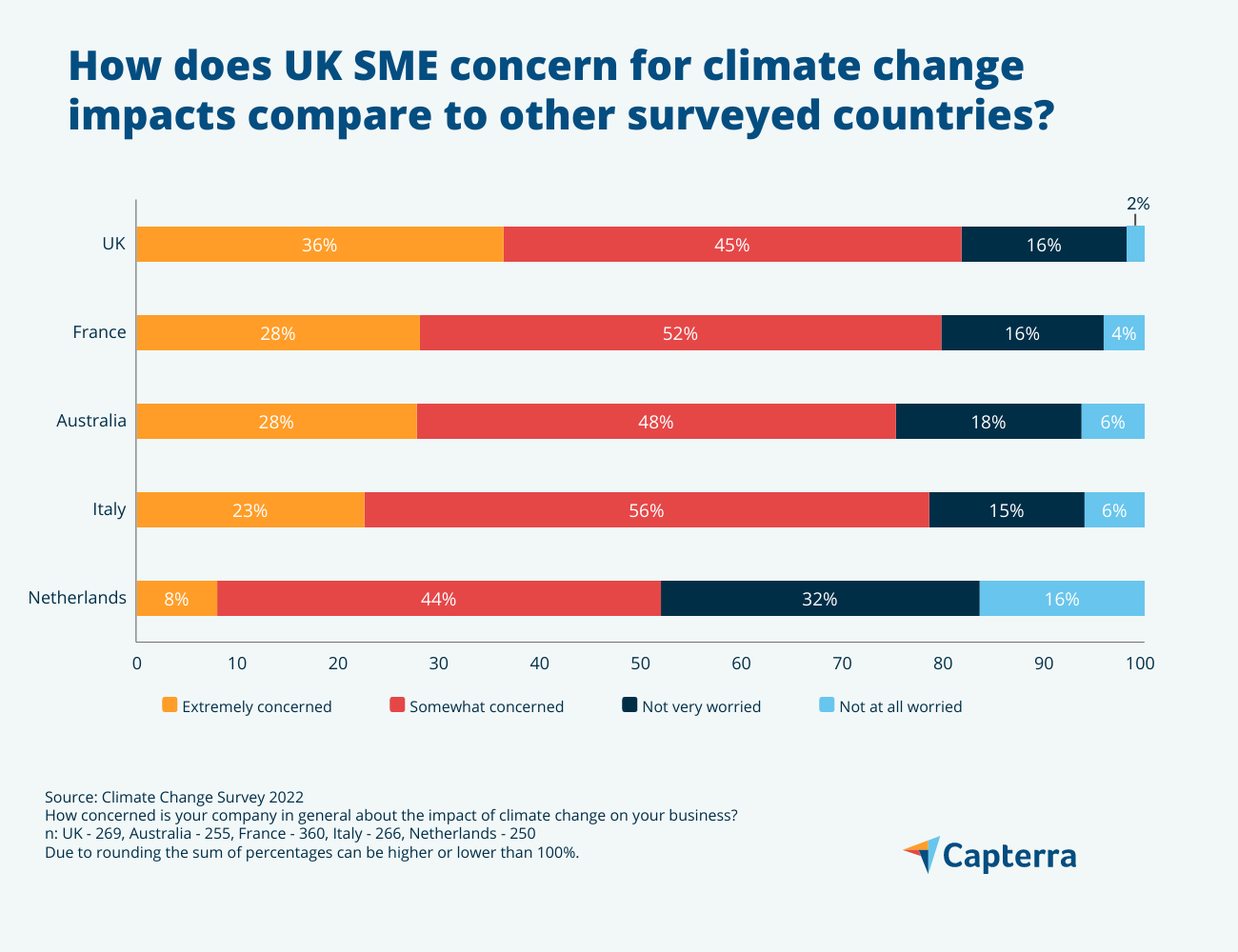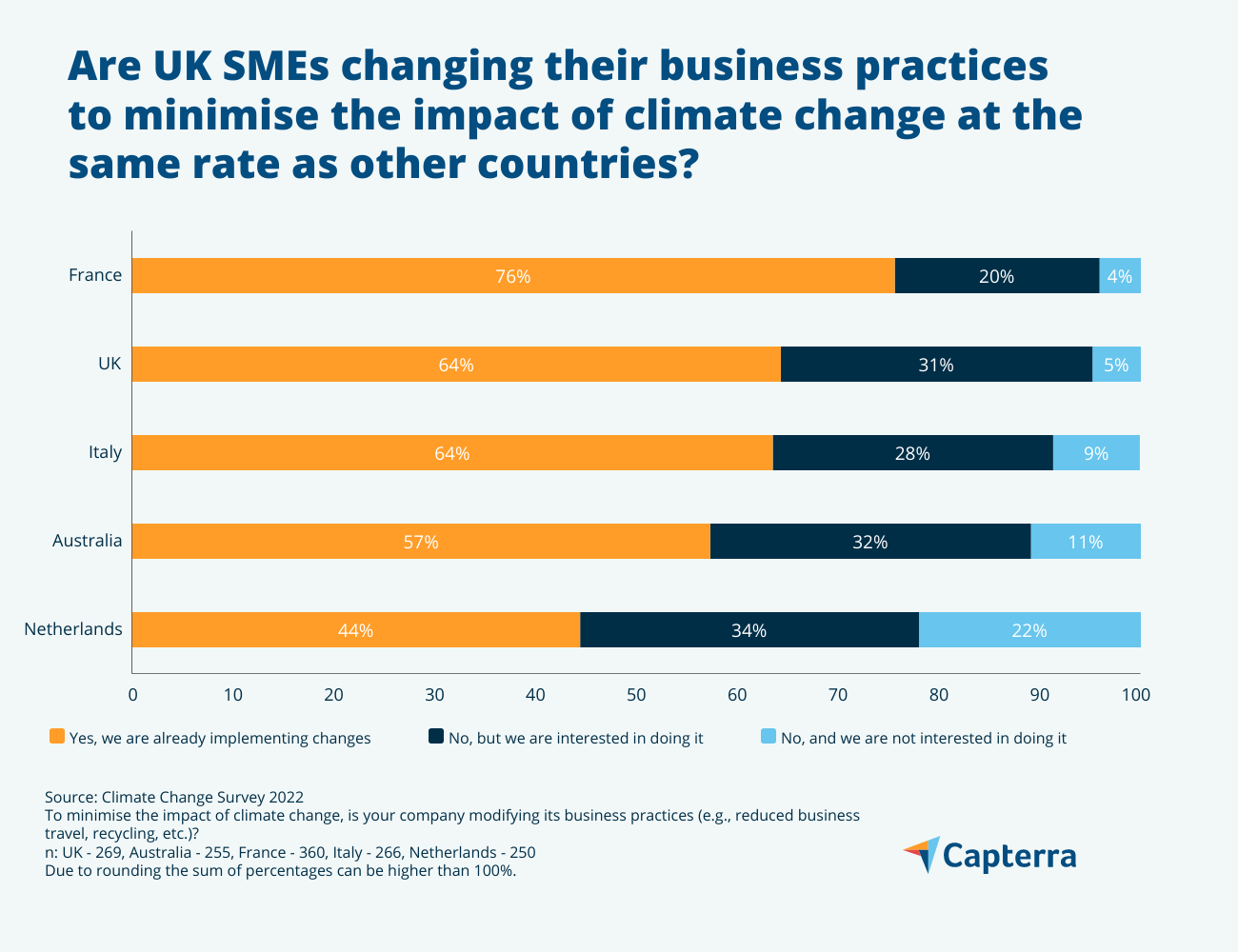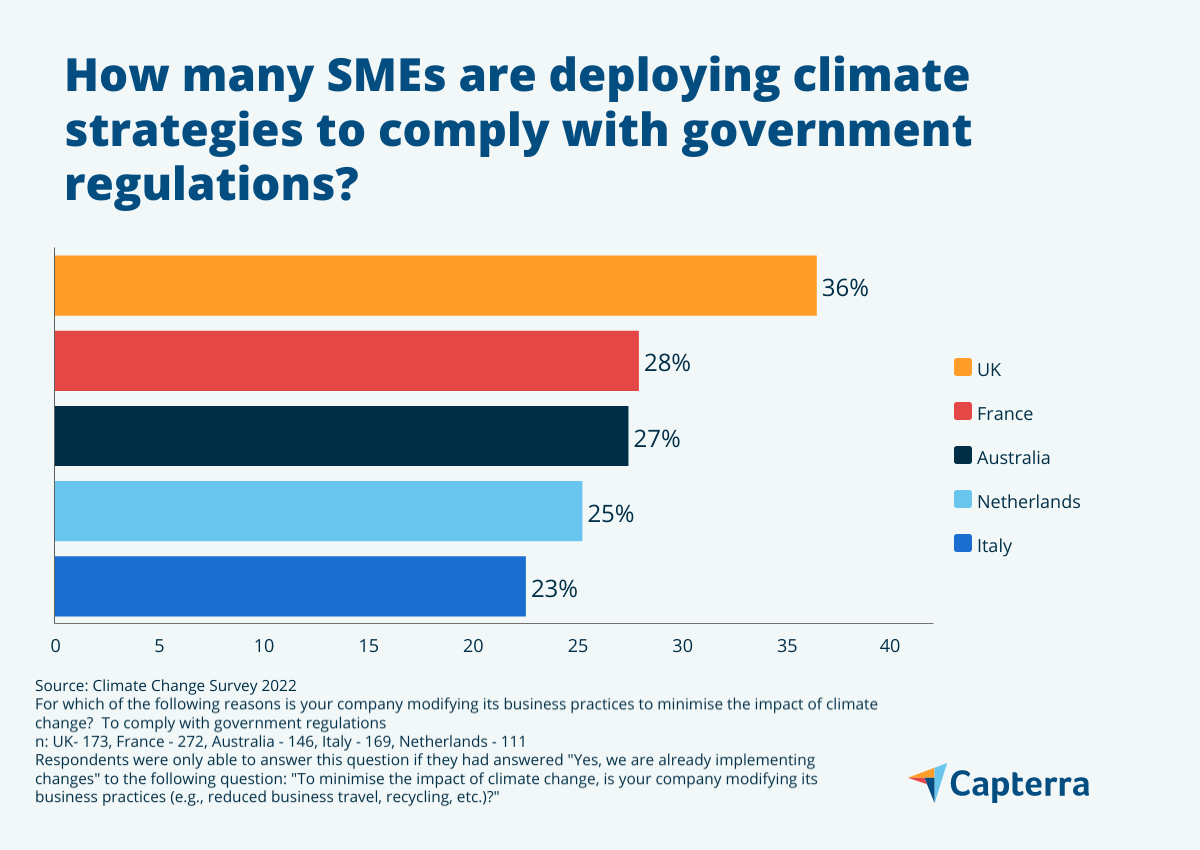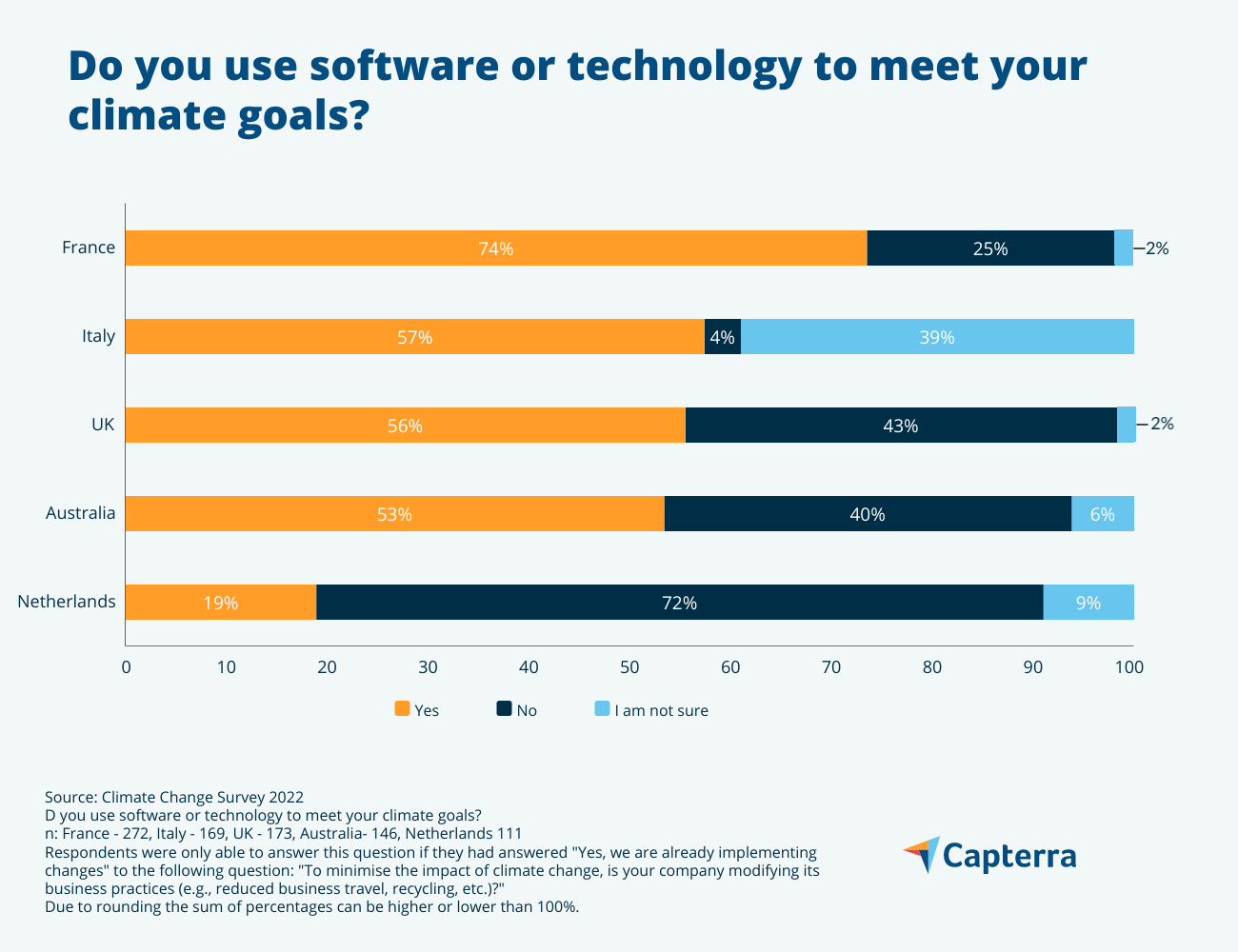Climate change has become a global issue affecting businesses across various sectors. Small to midsize enterprises (SMEs) in the UK are concerned about reducing carbon emissions and protecting the environment. Many companies deploy environmental, social, and governance (ESG) strategies to promote sustainable processes. Still, SMEs want better access to financial and government help and information to carry out global warming mitigation strategies. Are these concerns shared with SMEs abroad?

In this article
- UK SMEs lead in sharing climate change concerns
- How does government support to mitigate climate change affect different countries?
- How do UK SMEs fare when it comes to ESG strategies?
- Do UK SMEs face the same climate strategy challenges as other countries?
- 56% of UK SMEs use software to help meet climate goals
- UK SMEs should expand their tools to meet their climate goals
Climate change can affect businesses worldwide. In the first part of our climate change survey series, we saw that SMEs in the UK were committed to doing their part to cut carbon emissions and protect the environment. As part of their environmental initiatives, many businesses requested government support and deployed ESG strategies to foster sustainable processes.
However, the second part of our study identified concerns about access to financial help and information to implement global warming mitigation strategies. Are these concerns exclusive to the UK? Are British SMEs lagging behind other surveyed countries in terms of global climate action?
In this third and final article in the series, we will compare the climate change challenges and approaches of UK SMEs with those of SMEs in other countries, including Australia, France, Italy, and the Netherlands, based on a survey of 1,400 managers and executives.
The full methodology for conducting this study can be found at the bottom of this article.
UK SMEs lead in sharing climate change concerns
UK SMEs expressed the most concern about climate change compared to other surveyed countries. Over a third (36%) of UK respondents felt extremely concerned, while this figure dropped to 28% in France and Italy, the next most concerned countries in our study.
Results from the Netherlands contrasted the most with those from the UK. While 81% of UK respondents were extremely or somewhat concerned about the impact of climate change on their business, only 52% of Dutch respondents shared those thoughts. Furthermore, just 8% of these said they were extremely concerned.

UK employees also share climate change concerns
Employee concerns can also play a key role in the push for companies to adopt sustainable practices. From our survey, the UK ranks second in staff concerns about climate change, with 84% of British respondents saying their employees had been vocal about the issue (45% to a great extent and 39% in some particular cases).
French SMEs ranked first, with 86% of respondents saying employees had voiced concerns, while employees from the Netherlands were the least vocal on this issue, with only 46% sharing their climate change concerns with management.
How can SMEs help employees voice their concerns about sustainability practices?
Businesses can make use of software to allow employees to voice concerns and provide feedback about issues to their managers:
- Whistleblower software enables employees to anonymously report unethical or illegal practices to their managers
- Survey software allows staff to submit feedback on a range of topics, including climate sustainability concerns
- Internal communication software facilitates communication between employees and managers, and staff can also use it to report issues or concerns
Climate strategy implementation ranks strongly among UK SMEs
The UN has increasingly warned about the importance of responding to current pledges to reduce harmful carbon emissions. Some businesses are responding more than others. We wanted to know which countries were taking action on climate change and which had yet to introduce measures.
According to our survey, the UK has a high percentage of SMEs implementing business changes to mitigate climate change. With 64% of British SMEs already implementing business changes, only France has a higher number, with 76%.
In contrast, the Netherlands has the highest percentage of respondents not interested in changing their strategies to address climate change.

Government requirements affect UK SMEs more than other countries
Companies can decide to modify their business practices and actions to mitigate global climate change for several reasons. From our survey, we saw that the most common reason SMEs already implementing climate change strategies in all surveyed countries were doing so was that they genuinely believed that they had to take care of the environment.
However, when it came to the influence of government regulations on SME climate change strategies, our results highlighted some differences between countries. The UK had the highest number of respondents who said the need to comply with government rules was a motive for modifying their business practices. 36% of British businesses made these changes to comply with government regulations, followed by France with 28%.

The UK government's commitment to achieving net zero greenhouse gas emissions by 2050 may play a significant role in driving British SMEs to implement climate change strategies. The government's mandatory requirement in 2021 for firms to disclose climate-related financial information may have further encouraged SMEs to consider climate change risks and opportunities in their decision-making. This may influence why 85% of UK SMEs that have already implemented business changes to mitigate climate change risks have officially incorporated climate change goals into their company strategy, which is the second-highest percentage after France (86%).
How does government support to mitigate climate change affect different countries?
With the UK being the country most conditioned by government requirements when carrying out climate strategies, we wanted to know how SMEs felt about government support in different countries.

UK SMEs received more government support than other surveyed companies that were modifying their business practices to minimise the impact of climate change. 39% of UK SMEs were receiving aid, slightly more than the 37% of French respondents in the same situation.
On the other hand, Dutch SMEs, who had the lowest combined number of respondents implementing or interested in implementing climate change strategies, received the least government support, while Italy had the highest number of respondents who had requested but were still waiting to receive government aid.
UK SMEs demand the most financial support from the government
The highest expectation of government support to encourage companies to minimise the impact of climate change among all surveyed countries was for financial aid, according to respondents who were implementing changes in their business practices. Around two-thirds of UK SMEs wanted more financial help from the government, a notably higher proportion than in other surveyed countries.

How do UK SMEs fare when it comes to ESG strategies?
While government funding can provide important support for sustainability initiatives, ESG strategies enable companies to integrate sustainability into their core business operations. These initiatives can help attract investment while also mitigating risk and enhancing reputation.
However, are SMEs incorporating these strategies? Most of the surveyed countries are either implementing or interested in implementing ESG strategies, according to the survey.
- The UK has the second-highest percentage of respondents (39%) applying ESG strategies after France (46%)
- Additionally, the UK has the lowest percentage of respondents who are not interested in applying these strategies (9%)
- In contrast, 42% of Dutch respondents have no intention of deploying ESG initiatives
For the respondents who are already implementing ESG measures, UK SMEs expressed the most satisfaction with these methods among the surveyed countries. 84% of UK respondents consider these initiatives already helpful. France (83%), Australia (82%), and Italy (82%) also had high satisfaction rates, while the Netherlands had a lower rate of 67%.
Do UK SMEs face the same climate strategy challenges as other countries?
SMEs can face challenges when implementing environmental measures. Our survey found that UK SMEs had the highest percentage of respondents stating a lack of financial resources as a challenge (50%), while a lack of knowledge and skills was also present as one of the top three challenges in all surveyed countries.
Effective communication and education strategies can help inform and train employees and provide the right tools for them to carry out sustainable practices effectively. Are UK SMEs using tools to achieve these objectives?
56% of UK SMEs use software to help meet climate goals
According to our survey, SMEs from different countries have varied approaches when it comes to using software to help reduce their carbon footprint. Nonetheless, just 56% of UK businesses implementing environmental initiatives have used software or technology to help them meet their climate goals.
This is significantly less than the 74% of French SMEs implementing climate change strategies who say that they have used technology to pursue environmental goals. On the other hand, UK SMEs are more open to using technology than in the Netherlands, where only 19% of businesses deploying environmental strategies are doing so with the use of software.

Software to help SMEs take action on climate change
Software can play a crucial role in helping businesses reach climate goals by enabling them to track, analyse, and optimise their environmental impact. Here are some ways in which software can help:
- Waste management software can help companies monitor and optimise waste disposal processes to reduce waste generation and lower waste disposal costs
- Energy management software provides real-time data on energy usage so SMEs can track their energy consumption and identify areas of waste and energy efficiency opportunities to help reduce their carbon footprint and energy costs
- Emission management software enables businesses to forecast future emissions and ensure compliance with regional, state, and national regulations, as well as helping organisations carry out emission reduction plans and automatic CO2 calculations
- Compliance software alerts businesses to changing regulations and allows them to track compliance activities and generate reports for regulatory authorities, which can help SMEs avoid costly fines and reputational damage
- Supply chain management software helps automate the flow of processes of raw materials from collection to their delivery and make operations more efficient by distributing and synchronising data across multiple locations
- Sustainability software allows companies to set sustainability goals and track their progress, helping businesses identify areas that need improvement, manage their impact on the environment, promote social responsibility, and comply with government regulations on emissions, renewable resources, and recycling
- Digital signature software eliminates the need for physical signatures, automates and streamlines document workflows, and so reduces paper usage and improves efficiency
- Employee engagement software can help businesses engage their employees in sustainability efforts by providing education and training, and using gamification to encourage employees to reduce their environmental impact
UK SMEs should expand their tools to meet their climate goals
After comparing UK SMEs to other international respondents, our survey results show that a high number of UK companies are concerned about the impact of climate change, with the majority implementing or wanting to implement business changes to mitigate these risks. This concern is not below-par in comparison to other surveyed countries.
UK laws may have contributed to the high percentage of UK SMEs modifying their business practices. These businesses expect more financial aid from the government, despite being in one of the countries where SMEs tackling climate change receive the most support. However, when it comes to using technology to try and develop sustainable initiatives, the UK slightly lags behind some other countries, with just over half of respondents using software to help reduce their environmental impact.
Software can help SMEs with some of the challenges they face when trying to reduce their carbon footprint. Technology can help monitor and manage sustainability goals, keep track of finances, measure carbon emissions, and assist SMEs in complying with environmental regulations and achieving their ESG objectives.
Methodology:
To collect the data for this report, Capterra conducted an online survey in December 2022 of 1,400 decision-makers, comprising 269 (UK), 255 (Australia), 360 (France), 266 (Italy), and 250 (the Netherlands) owners and managers from a variety of industries. The respondents were selected according to the following criteria:
- Resident in the United Kingdom, Australia, France, Italy, or the Netherlands
- Over 18 years old
- Owner, executive manager, or senior manager at an SME (company with 2-250 employees)
- Works in a company where a significant portion of the employees regularly attend a physical workspace/office
- Must be able to identify the main business model of their company (B2B, B2C, or B2G)
- Works in a company that sells either products, services, or both
- Works in a company that was founded more than one year ago
